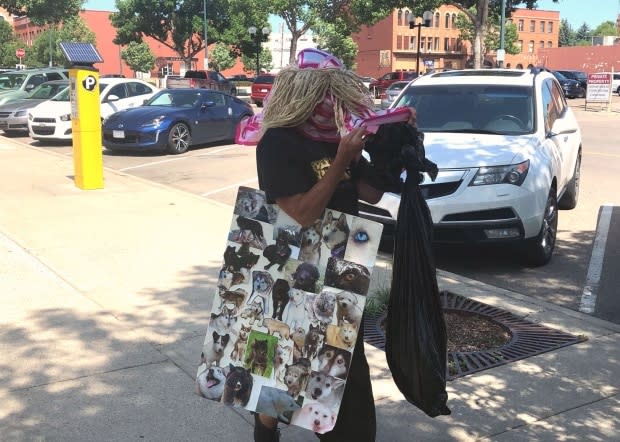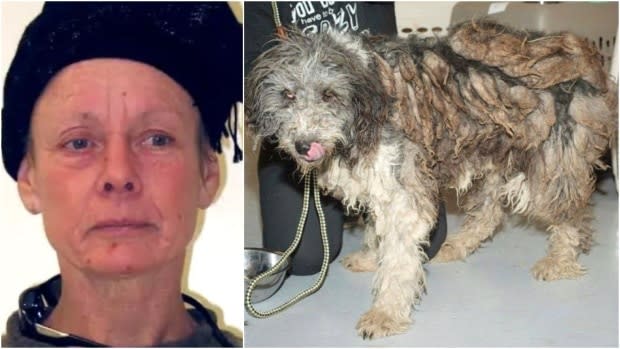'She will reoffend,' say animal rights advocates after April Irving given lifetime ban in one province
Warning: This story contains graphic details that may upset some readers.
A woman who was banned from owning dogs in Alberta for the rest of her life may move provinces and accumulate animals again, according to an animal advocate.
In July 2019, April Irving plead guilty in Lethbridge, Alta., court to four counts of causing an animal to be in distress. Irving had originally been facing 14 charges related to animal cruelty, although the majority were dropped after her guilty plea.
The charges were from 2015, when 201 dogs were seized from Irving's property near Milk River, Alta. The animals were found dehydrated, starving and chained in the yard. Five more, including newborns, were found dead. The Crown called the case one of the largest animal cruelty cases in Canadian history.
Irving was handed a lifetime ban from owning dogs in Alberta for the rest of her life. But she may soon be able to move provinces and own animals again. In 2010, 83 dogs were seized from her property in Foam Lake, Sask. She was given a 10-year ban from owning more than two dogs in Saskatchewan at a time in 2013. The ban expires in 2023
"Whatever you're charged in one province doesn't follow you to the next," Barbara Cartwright said. "It's very easy for people who hoard or puppy mill operators to be charged and convicted in one province — and move to the next. And we see that very clearly in the April Irving case."

Cartwright is the CEO of Humane Canada, the national organization advocating for the treatment of animals. She said a person's record only follows them if it is a charge under the Criminal Code. Irving was convicted under the Alberta Animal Protections' Act.
One challenge is that the Criminal Code doesn't completely cover animal neglect as the term in the code is "willful neglect," Cartwright said.
"It's a very high standard. You basically have to be able to prove that the person intended to neglect the animal and those two things don't typically go together," she said.
As a result, the Crown will charge people under provincial legislation because they know they can get a conviction, Cartwright said. It would be better to word the Criminal Code as "gross negligence" as then the Crown would need to prove the person didn't provide a standard of care, she said.

"In the April Irving case, there's an abundance of evidence that she deviated from the standard practice of caring for dogs," Cartwright said.
If Irving were charged under the Criminal Code, then it would have been possible for a judge to give her a Canada-wide ban, Cartwright said. Once the 10-year ban in Saskatchewan is up, there will be nothing stopping Irving from moving back to Saskatchewan and owning animals.
It's a matter of when
"We know from the research surrounding hoarding, unless the individual has insight into their condition and receiving extensive therapy, the recidivism is about 100 per cent," Don Ferguson said. "It's not a matter of if Miss Irving is going to reoffend, it's a matter of when."
Don Ferguson is the executive director of the Animal Protection Services of Saskatchewan. When it comes to hoarding, criminalizing the mental health issues behind hoarding may not be the best approach.
The Criminal Code is effective, but it's not being used effectively, he said. Ferguson would like to see more mental health support from a variety of agencies to address the underlying issues. The difficult aspect of that approach is that if a person isn't engaged, then therapy may not solve the underlying issues because a person may not want to change.

"We can fix the animal problem, like we can remove the animals from the individual's care, but we're not fixing the human problem that caused this animal problem," Ferguson said.
"We need to have healthy humans taking care of healthy animals. And you know in these instances we don't have healthy humans."
Ferguson said it will take a variety of agencies working together to get people who hoard animals proper help. When it comes to Irving, Ferguson isn't concerned about her returning to Saskatchewan as the protection services communicate between provinces to keep each other updated on people of interest.
"And it wouldn't matter if she had a court order that applied only in Alberta or all across Canada," Ferguson said. "She will reoffend."

Ferguson hopes in the future, members of the public will keep an eye out. People who hoard animals tend to isolate themselves, making it difficult to know what's happening, Ferguson said.
If a person has a large number of animals or animals in poor conditions, Ferguson said he hopes people will talk to their animal protection agency and let the agency decide if it is right or wrong.


